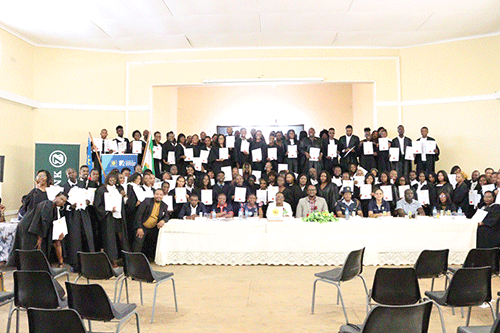Industrialisation and trade deputy minister Verna Sinimbo said entrepreneurs are a vital component that ensures the development and promotion of innovation, as they play a critical role in employment creation; however, Namibia is a country stricken by low levels of entrepreneurship.
During a recent graduation ceremony, she encouraged Women’s Action for Development (WAD) graduates to persevere in their plans and goals, and not be discouraged by becoming young entrepreneurs of micro, small and medium enterprises (MSMEs).
Sinimbo reminded the graduates that MSMEs are the main drivers for economic development, and they must be supported by everyone.
“You can use this ideal opportunity to establish economic activities in the country, which will contribute immensely to the economy of the country; make use of the conducive environment presented to you in your surrounding communities to establish businesses,” she advised.
More than 200 graduates were capped at the 2023 WAD graduation in Okahandja after receiving training in programmes such as office administration, computer literacy, hospitality and tourism, gender based violence and substance abuse, as well as intimate partner violence dialogue with men.
Sinimbo said these courses remain beneficial and significant courses socially and economically within communities and the nation at large.
“It is evident that Okahandja has dedicated and committed youth who are willing to strive to improve their livelihoods through skills development to secure chances of penetrating the labour market, or to become self-employed, independent and self-sustained through own income-generating ventures,” said Sinimbo. She assured: “We welcome the events of this nature, which seek to facilitate and coordinate developmental programmes to promote entrepreneurship, income generation and SME development to eventually contribute to achieving five national development plans, such as NDPs, Vision 2030 and Harambee Prosperity Plan”.
WAD’s executive director Salatiel Shinedima said the pervasive problem of unemployment among the youth, particularly the youth with low levels of education, is concerning.
“It is a challenge that strikes at the heart of our society, affecting not just individuals but our communities and the nation as a whole,” stated Shinedima.
He added that education allows individuals to ascend to greater heights, to reach for their dreams, and to contribute meaningfully to their communities.
“We must also acknowledge that not every individual’s journey through education is uniform. Many face obstacles that limit their access to higher levels of formal education,” Shinedima said.
Programme manager at Konrad Adenauer Stiftung (KAS), Dennis Zaire said capacity building, which encompasses developing and strengthening the skills, knowledge and abilities of individuals and organisations, plays a vital role in unlocking the potential of ordinary citizens.
“It empowers them to contribute to the development of their communities and nations, while also fostering economic growth. One of the key benefits of capacity building is its ability to create employment opportunities. By being equipped with the necessary skills and knowledge, you have enabled yourself to enter the job market with confidence and competence,” highlighted Zaire.
He noted that fostering a culture of continuous learning and adaptability beyond these programmes and within individual capacities is imperative.
WAD is a Namibian-based non-profitmaking and non-partisan NGO, which has been operational in Namibia since 1994.
WAD follows a two-pronged programme, namely the socio-economic and socio-political empowerment of rural women and men. The organisation is mainly sponsored by the Konrad-Adenauer-Stiftung since its establishment, and it is operational in all 14 regions of the country.
– psiririka@nepc.com.na


